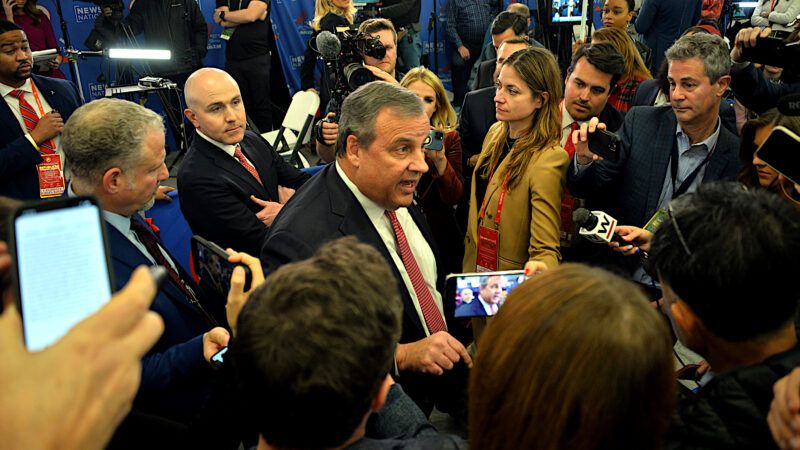Chris Christie Is Right, Trump's Trade War Accomplished Nothing
Nikki Haley says "Trump was good on trade." What?

Former New Jersey Gov. Chris Christie made a strong point at tonight's GOP presidential debate by criticizing former President Donald Trump's trade policies.
"You can't say he was good on trade," Christie said, directly rebutting a comment former South Carolina Gov. Nikki Haley had made earlier in the evening. "He didn't change one Chinese policy in the process. He failed on it."
"All he did was impose tariffs, which raise the prices for every American," Christie added.
Trump's presidency overturned decades of a generally pro-trade Republican consensus and ushered in an era of assuming that trade is bad for American workers and consumers. He hiked tariffs on steel, aluminum, solar panels, washing machines, and a wide range of Chinese goods. For Trump and his allies, those higher tariffs—which were directly paid by American importers and consumers—were meant to reconfigure the trading relationship between America and China.
But Christie is exactly right. It failed.
The one material thing Trump's trade war accomplished was a so-called "phase one" trade deal with China, which he signed with Chinese President Xi Jinping to much fanfare in December 2019. That deal included a promise that China would buy $200 million more American exports annually. Those increased purchases were supposed to be spread across multiple sectors of the American export economy, something Trump promised would provide much-needed relief to farmers, manufacturers, and other businesses harmed by the tariffs he'd imposed since taking office.
China didn't do that. According to an analysis by the Peterson Institute for International Economics, American exports to China didn't even reach pre-trade-war levels in the first year that "deal" was in place. Both countries seem to have quietly dropped any pretense of following through on the agreement.
It's certainly true that the COVID-19 pandemic, which disrupted global supply chains in ways that couldn't be foreseen when Trump and Xi signed that deal, played a role in that outcome. But the idea that China could be cajoled into buying more American goods—as if it is nations that trade with one another, as opposed to individuals living within those nations—was always misguided and made Trump's approach unlikely to succeed.
And the idea that piling tariffs—that is, taxes—on Americans would change China's behavior? That was never based in reality.
Similarly, Trump claimed that his policies would reduce America's trade deficit—the annual gap between imports and exports. But the trade deficit continued to rise while he was in office, and recently hit a new record high. (The good news is that a country's trade deficit doesn't really matter.)
During Trump's time in office, there was a sizable segment of Republicans who at least regularly called these claims into question. But they have largely left, or were driven out of the party, and the GOP candidates running for office this year seem to share Trump's skepticism about the value of foreign trade.
It was refreshing to hear Christie—though he is also likely on his way out of GOP politics—keep the flame of sensible Republican thinking on trade alive.


Show Comments (100)